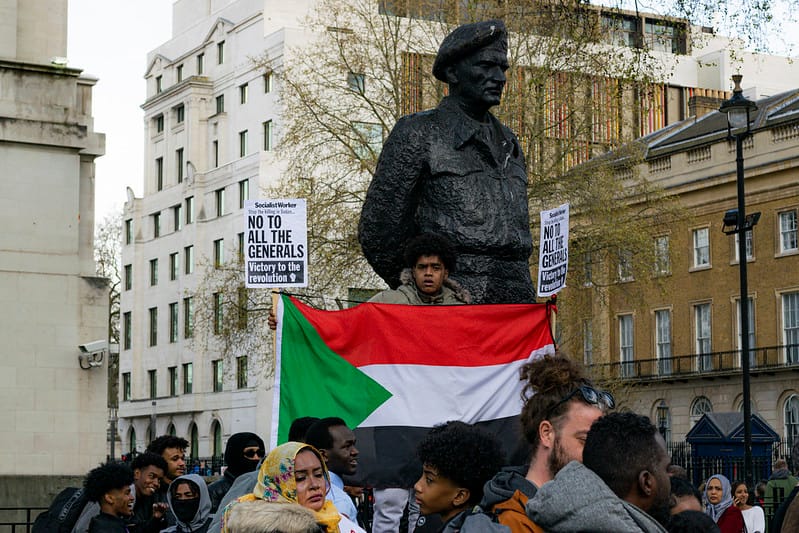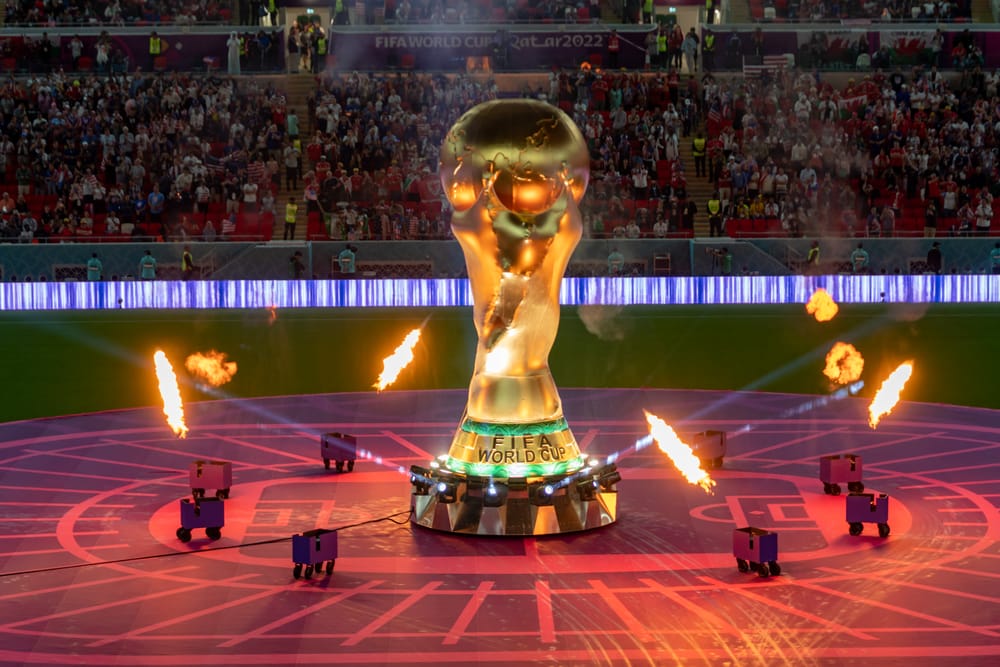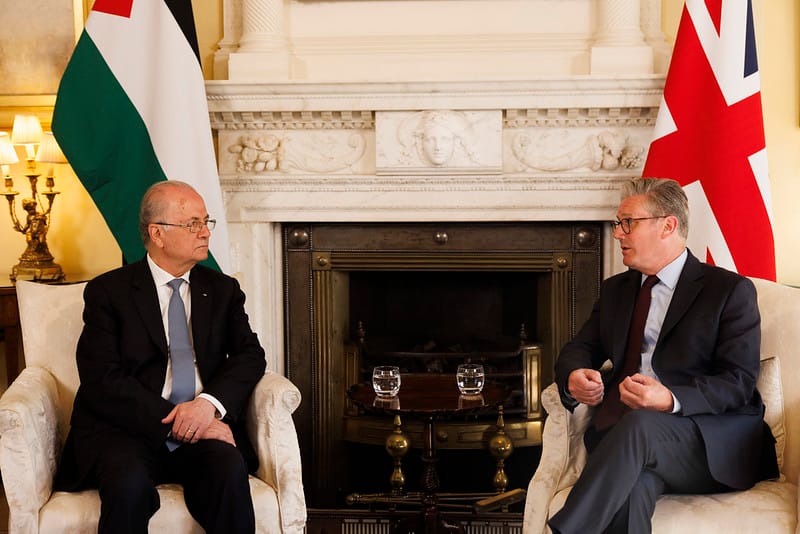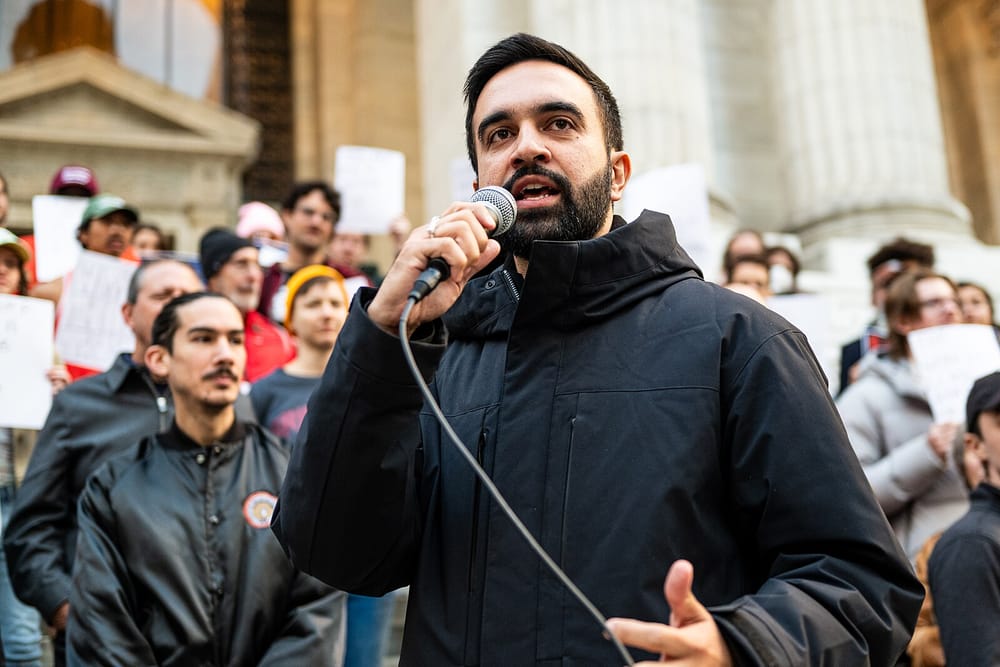The urgency of solidarity from Gaza to Sudan
Two decades after the “Save Darfur” movement failed, the recurrence of ethnic cleansing and famine in Sudan calls for an international response that better accommodates political complexity.

Like the student protestors currently immersed in a struggle to protect Palestinians from Israeli violence, I too came of age at a time when faraway conflict captured the sympathies of a global audience. In the mid-2000s, when I was attending university in America, it was civilians in Sudan's northwest Darfur region who were the victims, as targets of slaughter at the hands of the government of Omar al-Bashir.
At that time, Sudan’s president, responding to rebellion from the marginalised Darfuri population, had empowered local paramilitaries to ethnically cleanse the territory. Despite possessing oil and being on the list of pariah states in the global war on terror, Sudan was not a country normally high on the radar of Western publics. However, thanks to a new breed of celebrity-like humanitarians and philanthropists, what was eventually deemed a genocide in Darfur was thrust into the spotlight. Through use of rallies, campus awareness-raising events, and film screenings, as well as through the newly-invented tools of “networked activism” such as online lobbying campaigns and Facebook groups, a generation of young “active citizens” like myself not only “bore witness” to the atrocities, but were purposefully and zealously mobilised to “Save” Darfur.
We were the second wave of the post-Cold War “Never Again” generation. The first was characterised by its insufficient action in the face of genocide, particularly in Rwanda and Bosnia. Having absorbed those failures, we, the privileged heirs of this moral responsibility, were not going to make the same mistakes. Led by celebrity human rights champions such as Samantha Power (then at Harvard), Nicholas Kristof (op-ed columnist at the New York Times), and George Clooney (future husband of human rights lawyer Amal Clooney), America was going to make good on its status as global policeman, by employing Western military and institutional power to limit the scale of mass slaughter across the world’s most vulnerable and ungoverned regions. Africa was seen as the archetypal humanitarian theatre for such interventions.
In short, the point was not to challenge US global supremacy, but to harness it to solve the world’s problems. This white saviourism would reach its absurdist apogee with the #Kony2012 movement, in which a band of Californian Christ-loving filmmakers aimed to crowdsource a military solution to rebel leader Joseph Kony’s campaign of terror in northern Uganda (himself also claiming a mandate from Christianity). In both cases, international troops were eventually deployed and ICC arrest warrants issued, yet the situation on the ground was not fundamentally altered. In the end, the fighting both in Darfur and Uganda would subside to levels no longer deemed newsworthy, not thanks to Western pressure but as a result of changes in internal political dynamics.
Sadly, nearly two decades later, an emergency in Darfur of similar proportions is again rearing its head, as a result of many of the unresolved issues of the past. In the intervening period between then and now, Sudan witnessed a traumatic split between north and south (2011), several major protest events (including during the Arab Spring and in 2018-19), and ultimately a revolution which toppled the seemingly invincible al-Bashir in 2019. Also during this period, the armed militias that had previously terrorised Darfur were institutionalised as security actors within the (north) Sudani state, and renamed the Rapid Support Forces (RSF). This occurred in no small part thanks to European donors, who utilised the group as an outsourced enforcer of their anti-migrant agenda. In 2019, with al-Bashir out of the way, it was the RSF, alongside the military establishment, who swooped in to usurp the mantle of political change from the revolutionaries, doing their best to stymie any attempt to transition to civilian, democratic rule.
For four years, RSF leader Mohamed Hamdan “Hemedti” Dagalo, Sudan Armed Forces (SAF) chief General Abdel Fattah al-Burhan, and a rag-tag group of civilian actors tussled against each other to define Sudan’s political future. However, in April of last year, all hopes of progress dissipated when fighting broke out between the RSF and SAF leaders, in which a contest for supreme authority quickly escalated into an all-out civil war.
Since the fighting began 13 months ago, an estimated 6.8 million people have become internally displaced, with another 2 million or so having fled abroad (mostly to neighbouring countries), making Sudan home to “the already largest displacement crisis in the world”. As a result of a drastic shock to food security systems, this highly fertile, agriculturally-productive region of Africa now faces “the world’s largest hunger crisis”, with 18 million people currently suffering “high levels of acute food insecurity,” with the prospect of a “a famine we haven’t seen in decades” likely around the corner. If drastic humanitarian action is not taken, a total of about 2.5 million people are likely to die from famine-related causes by the end of September this year.
And, while no region of Sudan has been left untouched by the current devastation, it is again Darfur where the crisis risks becoming especially murderous. As reported by Human Rights Watch, between April and November 2023, the RSF and allied militias engaged in a “systematic campaign” of ethnic cleansing and slaughter of ethnic Massalit communities, which has taken the lives of an estimated 10,000 to 15,000 people in the El-Geneina area alone (one of five major population centres in the Darfur region). Having made significant military gains in many parts of Darfur, the RSF is now setting its sights on El-Fasher, with a current population of as many as two million (including non-Arab Massalit and Zaghawa communites, among others), and a major coalescing point for IDPs seeking refuge from other areas of the region. As Yale School of Public Health’s Humanitarian Research Lab warns, if the RSF were to defeat SAF troops stationed in El-Fasher, as seems highly likely, then its next targets are likely to be civilians from non-Arab ethnic groups, with “these at-risk populations” having “no clear route to safely escape…before this scenario may occur.”
At a time when so much of our energy and sympathy here in the UK is consumed by the tragic situation in Gaza, it is not surprising that other catastrophic global developments fail to get the attention they deserve. Indeed, any wavering of complete focus from Israel’s crimes could be experienced as a betrayal, as a dilution of the full-court press needed to bring about Palestinian liberation, especially when bad-faith pro-Israel actors themselves point to situations such as Sudan as a cheap and cynical form of “whataboutism” to minimise the violence in Gaza. While I sympathise with such logic, I also find it insufficient, and indeed see it as a failure of political imagination on the part of the Western left.
There was a time when the situation in Sudan had captivated the Western left, as we proclaimed our solidarity with the popular movements and resistance committees leading the revolution against Omar al-Bashir. Indeed, for that brief, inspiring moment, when the battle lines between oppressor and oppressed were clear, we sat up and took notice, as we have done for Israel/Palestine, where a division between coloniser and colonised, settler and refugee, provides a solid moral reference point. However, now, when civilians and revolutionaries are caught between rival power blocs who are equally unpalatable and resistant to radical change, and when the decisive imperial element comes not from the West but from the UAE – whichequips RSF forces in exchange for influence, access to resources (primarily gold) and control over trade routes (via port construction) – we on the Western left have little to offer.
For too long, complexity and uncertainty has been our Achilles’ heel when it comes to international solidarity. From a safe distance, when the realities on the ground do not confront us with all their material and corporeal weight, we can either ignore the issues that do not fit within our narratives, or distort uncomfortable facts in ways that soothe our conflicted consciences. Just ask any Ukrainian defender of self-determination or Syrian opponent of Assad, who have seen their causes clouded in conspiracy among those who cannot compute an imperialism that comes from the West’s main adversaries.
But reckoning with Western imperialism cannot mean simply reining in instances where we are actively militarily and financially complicit; it equally entails finding ways to heal, repair and offer soft landings to places that we have meddled in and then abandoned. This includes Sudan, where, after decades of US, UK and European involvement in shaping Sudanese politics through UN missions, peace negotiations and counter-terrorism operations, these standard-bearers of the liberal international order have abdicated responsibility during this time of great need, failing to apply political pressure on warring factions or fund more than more than 6% of the $2.7bn emergency appeal.
This does not mean we should return to the old days of liberal humanitarianism. Darfur must not merely be “saved”; it, like Palestine, must ultimately be “freed,” with all the agency and radicality this shift in emphasis entails. Nor does it mean redirecting resources and focus away from Palestine, in line with a more even “proportionality” vis-à-vis other crises. It means developing a more capacious, intellectually demanding and locally accountable understanding of how power and exploitation operate, to better take into account the compromises, hard choices, divisions and uncertainties than any oppressed people face. Guaranteeing the survival of the temporarily defenceless is itself a radical act, and, given the predominance of a capitalist, nation-state system so willing to dispense with a large portion of humanity, is one that is necessarily antisystemic.
This entails no longer reproducing politics along the geopolitical faultlines of the liberal imagination, but with the poles between good and evil merely reversed. Instead, we must pay attention to the multifarious ways that different actors plug into and out of global structures of power and wealth accumulation. For example, one reason the US and UK's response to the Sudan conflict has been so tepid is precisely because it has become increasingly dependent on the UAE as a Middle Eastern enforcer of “security” and logistical connectivity, and as a source of surplus financial capital.
It equally means reckoning with the faults of our geopolitical heroes. For instance, while South Africa is rightly celebrated for its role in bringing Israel to account for its war crimes in Gaza at the ICJ, we must also acknowledge that this same government has not applied the same pressure to the perpetrators of mass violence in Sudan. Indeed, the country's current president, Cyril Ramaphosa, was one of the several African heads of state who hosted General Hemedti during his recent PR tour of the continent, thus knowingly contributing to the legitimisation of this longtime war criminal. This selectivity is certainly not the result of a nefarious singling out of the “only Jewish state,” but it is a sign of a certain unscrupulous realpolitik calculation that infects all states, not just those in the West, despite recent overblown talk of a revival of Global South solidarity. And while the latter does not discredit the former, neither does the former excuse the latter.
In short, as artillery shells indiscriminately fall on residential areas in Darfur’s El-Fasher, and as arson attacks against civilians mount, immediate action is needed to save lives. At the same time, any lasting solution to Sudan’s larger political crisis means overcoming a global political order built on military strongmen and the securitisation of politics, and instead ensuring that Sudan’s fledgling movement of radical democracy, which developed over the course of the country’s various uprisings, is given space to flourish. Whether in Palestine or Sudan, the answer is not dividing the world into good states and bad, into “revolutionary” violence and “reactionary” violence, but to promote global forms of collective power not reliant on hierarchical governance structures or violent means at all.
Dr Matthew Gordon is an academic and international development practitioner with over a decade of experience working in the Horn of Africa, and an editor at Vashti.
Author

Dr Matthew Gordon is an academic and international development practitioner with over a decade of experience working in the Horn of Africa, and an editor at Vashti.
Sign up for The Pickle and New, From Vashti.
Stay up to date with Vashti.



